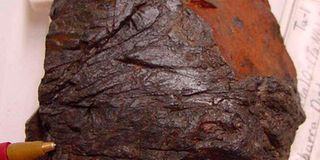
Rare minerals on display. A suspect is facing charges of cunningly disguising ordinary soil and rocks as valuable tantalum-niobium and shipping it to a buyer in China.
The Directorate of Criminal Investigations (DCI) has revealed how ordinary soil and rocks were cunningly disguised as valuable tantalum-niobium ore and shipped to China in a multi-million-dollar fraud targeting a Chinese company.
Testifying before a Mombasa court, Charles Osumba of DCI Operation Support Unit recounted how containers were cross-stuffed in Mombasa and shipped to China instead of the geniune minerals from the Democratic Republic of the Congo.
A suspect, Lumumba Ulundu Patrick alias Gabriel Kulonda Ilungu or Lumumba Patrick Byarufu, has been charged with conspiracy to commit a felony and obtaining money by false pretenses.
It is alleged that between August and December 2023, Mr Lumumba conspired with others not before the court to steal $1 million (approximately Sh129 million at current exchange rates) from Yingcheng (Shenzen) International Trade Company by pretending they could supply 84 metric tonnes of tantalum-niobium ore.

Tantalite.
The mineral, which is often referred to as tantalite is highly sought. It is used in the manufacture of mobile phones and other electronic components.
The prosecution alleges that Mr Lumumba was at the centre of the export of this fake mineral cargo in a complex transnational scheme.
Guided by State Counsel Hillary Isiaho, the DCI detective detailed how the accused, acting on behalf of a Ugandan-registered firm, Sanjola Company Limited, conspired to defraud Chinese-based Yingcheng (Shenzen) International Trade Company Limited.
The Chinese company’s representative said that they were introduced to Mr Lumumba— who posed as a legitimate trader — by another Chinese national who claimed to have vast experience in Africa’s mineral trade.
28 tonnes
An initial contract for the sale of 28 metric tonnes was signed in October 2022, although the buyer had first requested only 10 tonnes. The court heard that the seller, through persuasive negotiation, prevailed upon the firm to commit to the full 28 tonnes with an assurance that representative could pay for only the 10 tonnes that she needed immediately. She had, by this time, paid $10,000 through the advocate’s account to facilitate transfer of the consignment to the company’s name.
To support the transaction, the buyer wired $270,000 to an account belonging to a Kenyan advocate — the designated escrow agent. The funds were purportedly for the shipping and legal transfer of the consignment.
However, the court heard that Sanjola Ltd did not ship the consignment. The buyer got advice from her legal counsel to give power of attorney to Mr Devis Otieno to supervise the transaction and protect her interests.
"The buyer later received explanation from Sanjola company that the delay in shipping was as a result of frustration in an attempt to split the consignment as well as the high cost involved in such an exercise," Mr Osumba told Senior Principal Magistrate Dolphina Alego.
The buyer then demanded to see the consignment. A legal team that she sent to verify the consignment was allowed to view the containers. The team took video clips and sent them to the buyer. However, the legal team was not allowed to verify the content of the three containers.
According to the investigator, the buyer was warned that separating 10 tonnes from the 28-tonne consignment would be a costly exercise, estimated at Sh84 million. This influenced the buyer's decision to enter into a second agreement with Sanjola.
This second sale agreement was signed on November 9, 2023, increasing the consignment to 84 tonnes at a cost of $28,000 per tonne, bringing the total value to $2.35 million. The buyer then transferred a further $1 million to the same advocate’s escrow account on December 26, 2023, on the understanding that the funds would only be released upon confirmation of the goods’ arrival and authenticity at Nansha Port in China.
However, the elaborate fraud scheme began to unravel when the shipment finally arrived in China.
Black-coloured ore
"Instead of the valuable black-coloured ore used in the electronics industry, the containers were found to contain ordinary brown soil and rocks, this prompted the buyer to raise a complaint leading to the Kenyan authorities to launch a probe," said the witness.
Mr Osumba said investigations revealed that on November 18, 2023, Mr Lumumba requested and was granted authorisation by customs officers to conduct cross-stuffing at the Mombasa Container Terminal.
This process involved swapping contents between containers — an opportunity the court heard was allegedly used to replace any legitimate minerals with fake material.
20-foot containers
The investigator said that the contents of a 40-foot container were emptied into two 20-foot containers, while drums from those smaller containers were moved into the larger one.
He said the investigations showed that it was these two 20-foot containers, along with another container, that were eventually shipped to China.
“The contents, packed in metallic drums, were not visible during physical inspections at the warehouse,” Mr Osumba said.
The fourth container was later recovered in Mombasa’s Toyo area, still packed with the suspect material. Further investigations found that part of the $1 million wired to the escrow account was diverted, thile $949,463.41 was moved into a secondary escrow account, a suspicious balance of $50,500 was directed to a Kenya shillings account and withdrawn in breach of their sale agreement.
The court also heard that the accused allegedly failed to collect the original bill of lading from the shipping line and never travelled to China to supervise the delivery and verification of the cargo as initially agreed.
Mr Osumba from the DCI also told the court that samples had been taken during the initial stages and submitted to government laboratories for testing, but a letter from one of the government agencies led to the release of the consignment before the result could be received.
To support the prosecution’s case, the witness who was involved in investigating the case submitted to the court a series of documents, emails, and shipping manifests that supported the narrative of fraud.
He also recounted how other containers associated with Sanjola Company were traced within Mombasa, further strengthening the prosecution’s case.
Initially, the court heard intelligence had indicated that the consignment was gold smuggled from the DRC. It also emerged that the consignment was already in Mombasa as early as the first week of April 2022 as a cargo destined to another consignee.





